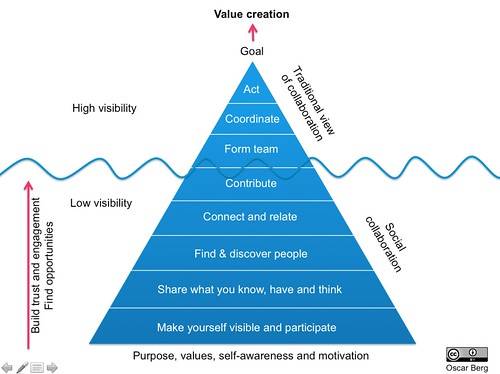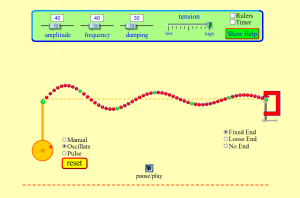The Collaboration Pyramid offers a great visual to dive deeper into the nature of authentic collaboration and optimized production.
In traditional team-based collaborative models we experience the "form, storm, norm and perform" process, and it has proved to be very useful in the context of team effectiveness, but perhaps leaves a bit of a void in the area of personal responsibility, or individual motivation to make a meaningful contribution to the team.
The Collaboration Pyramid displays a broader platform to support a different context for collaboration that may eventually lead to more authentic and meaningful personal investment in the team process. I think social collaboration as framed in the diagram is closely related to the concept of morphic resonance.
morphic resonance [ˈmɔːfɪk]
n
(Life Sciences; Allied Applications / Biology) the idea that, through a telepathic effect or sympathetic vibration, an event or act can lead to similar events or acts in the future or an idea conceived in one mind can then arise in another...In the first stage of social collaboration it is assumed that individuals have reflectively defined their own purpose and values, and that through reflection, these have manifested as personal philosophies; relative degrees of self-awareness and motivation to be present and contribute. This is the point where individuals become participants; they feel confident to share what they feel, think and do. Their personal philosophies become known and ideas conceived in their minds can then arise in the minds of others by way of social interaction. They are sharing, and also receiving...
RCVR from notthisbody on Vimeo.
This act of becoming visible and participating as a receiver creates possibility in teaching and learning. It's where morphic resonance begins. It is the first stage of interaction in the social collaboration process. Putting ourselves out there as receivers in the collaborative process frames our participation in group learning as self-motivated, reflective and social. It puts us in motion toward others who are also self-motivated, reflective and social, and the interdependent levels of the collaboration pyramid begin to flourish.
When we share what we feel, think and do, we are displaying vulnerability in the learning process. Sharing is a fundamental element of social participation that feeds a self-organizing learning environment. When we are vulnerable and put our knowledge and thoughts out there, we tend to attract others who are compelled by similar domains of knowledge and ideas. When we begin to talk about these shared domains, the dialogue may attract new collaborators intrigued by a perspective they hadn't considered yet. People find others and discover their varied points of view, and they choose to connect and relate, or not... and the or not part of this is very important. The foundation of purpose, values, self- awareness and motivation that underpins everyone's relative participation in the collaboration pyramid helps them decide whether to engage, or not. It is more than OK for people to not engage. Choice is the rule of engagement. Everyone has the right to choose whether to engage in sharing and receiving, or not depending on their independent purpose, values, self-awareness and motivation.
The social collaboration side of the Collaboration Pyramid posits a collaborative model where the processes of building trust, engaging with others and their ideas and seeking learning opportunities becomes more ubiquitous, open and visible as a result of our willingness to share, receive, connect and contribute.
APA citation: Berg, O. (2012, February 14). The collaboration pyramid (or iceberg). In The Content Economy: Envisioning the Future of Knowledge work, and Defining the Steps We Must Take to Get There. Retrieved January 10, 2013, from http://www.thecontenteconomy.com/2012/02/collaboration-pyramid.html








